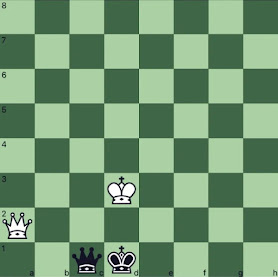Zugzwang (pronounced tsook-tsvahng)
(1) In chess, a situation in which a player is limited to moves that cost pieces or have a damaging positional effect.
(2) A situation in which, whatever is done, makes things worse (applied variously to sport, politics, battlefield engagements etc).
(3) A situation in which one is forced to act when one would prefer to remain passive and thus a synonym of the German compound noun Zugpflicht (the rule that a player cannot forgo a move).
(4) In game theory, a move which changes the outcome from win to loss.
Circa 1858 (1905 in English): A modern German compound, the construct being zug+zwang. Zug (move) was from the Middle High German zuc & zug, from the Old High German zug ,from Proto-Germanic tugiz, an abstract noun belonging to the Proto-Germanic teuhaną, from the primitive Indo-European dewk (to pull, lead); it was cognate with the Dutch teug and the Old English tyge. Zwang (compulsion; force; constraint; obligation) was from the Middle High German twanc, from the Old High German geduang. It belongs to the verb zwingen and cognates include the Dutch dwang and the Swedish tvång. The word is best understood as "compulsion to move" or, in the jargon of chess players: "Your turn to move and whatever you do it'll make things worse for you", thus the application to game theory, military strategy and politics where there's often a need to determine the "least worse option". Zugzwang is a noun; the noun plural is Zugzwänge. In English, derived forms such as zugzwanged, zugzwanging, zugzwangish, zugzwanger, zugzwangesque and zugzwangee are non-standard and used usually for humorous effect.
Chess and Game Theory
The first known use of Zugzwang in the German chess literature appears in 1858; the first appearance in English in 1905. However, the concept of Zugzwang had been known and written about for centuries, the classic work being Italian chess player Alessandro Salvio's (circa 1575–circa 1640) study of endgames published in 1604 and he referenced Shatranj writings from the early ninth century, some thousand years before the first known use of the term. Positions with Zugzwang are not rare in chess endgames, best known in the king-rook & king-pawn conjunctions. Positions of reciprocal Zugzwang are important in the analysis of endgames but although the concept is easily demonstrated and understood, that's true only of the "simple Zugzwang" and the so-called "sequential Zugzwang" will typically be a multi-move thing which demands an understanding of even dozens of permutations of possibilities.
French sculptor Auguste Rodin's (1840-1917) The Thinker (1904), Musée Rodin, Paris (left) and Boris Johnson (b 1964; UK prime-minister 2019-2022) thinking about which would be his least worst option (left).
In its classic form chess is a game between two, played with fixed rules on a board with a known number of pieces (32) and squares (64). Although a count of the possible permutations in a match would yield a very big number, in chess, the concept of Zugwang is simple and understood the same way by those playing black and white; information for both sides is complete and while the concept can find an expression both combinatorial game theory (CGT) and classical game theory, the paths can be different. CGT and GT (the latter historically a tool of economic modelers and strategists in many fields) are both mathematical studies of games behaviour which can be imagined as “game-like” but differ in focus, assumptions, and applications. In CGT the basic model (as in chess) is of a two-player deterministic game in which the moves alternate and luck or chance is not an element. This compares GT in which there may be any number of players, moves may be simultaneous, the option exists not to move, information known to players may be incomplete (or asymmetric) and luck & chance exist among many variables (which can include all of Donald Rumsfeld’s (1932–2021: US defense secretary 1975-1977 & 2001-2006) helpful categories (known knowns, known unknowns, unknown unknowns & (most intriguingly) unknown knowns). So, while CGT is a good device for deconstructing chess and such because such games are of finite duration and players focus exclusively on “winning” (and if need be switching to “avoiding defeat”), GT is a tool which can be applied to maximize advantage or utility in situations where a win/defeat dichotomy is either not sought or becomes impossible. The difference then is that CGT envisages two players seeking to solve deterministic puzzle on a win/lose basis while GT is there to describes & analyse strategic interactions between & among rational actors, some or all of which may be operating with some degree of uncertainty.
In politics and military conflicts (a spectrum condition according to Prussian general and military theorist Carl von Clausewitz (1780–1831)), a zugzwang often is seen as parties are compelled to take their “least worst” option, even when circumstances dictate it would be better to “do nothing”. However, the zugzwang can lie in the eye of the beholder and that why the unexpected Ardennes Offensive, (Wacht am Rhein (Watch on the Rhine) the German code-name though popularly known in the West as the Battle of the Bulge, (December 1944-January 1945)) was ordered by Adolf Hitler (1889-1945; Führer (leader) and German head of government 1933-1945 & head of state 1934-1945). It was the last major German strategic offensive of World War II (1939-1945) and among all but the most sycophantic of Hitler’s military advisors it was thought not “least worst” but rather “worse than the sensible” option (although not all the generals at the time concurred with what constituted “sensible”). Under the Nazi state’s Führerprinzip (leader principle) the concept was that in any institutional structure authority was vested in the designated leader and that meant ultimately Hitler’s rule was a personal dictatorship (although the extent of the fragmentation wasn’t understood until after the war) so while the generals could warn, counsel & advise, ultimately decisions were based on the Führer’s will, thus the Ardennes Offensive.
While the operation made no strategic sense to the conventionally-schooled generals, to Hitler it was compelling because the tide of the war had forced him to pursue the only strategy left: delay what appeared an inevitable defeat in the hope the (real but still suppressed) political tensions between his opponents would sunder their alliance, allowing him to direct his resources against one front rather than three (four if the battle in the skies was considered a distinct theatre as many historians argue). Like Charles Dickens’ (1812–1870) Mr Micawber in David Copperfield (1849-1850), Hitler was hoping “something would turn up”. Because of the disparity in military and economic strength between the German and Allied forces, in retrospect, the Ardennes Offensive appears nonsensical but, at the time, it was a rational tactic even if the strategy of “delay” was flawed. Confronted as he was by attacks from the west, east and south, continuing to fight a defensive war would lead only to an inevitable defeat; an offensive in the east was impossible because of the strength of the Red Army and even a major battlefield victor in the south would have no strategic significance so it was only in the west a glimmer of success seemed to beckon.
In the last great example of the professionalism and tactical improvisation which was a hallmark of their operations during the war, secretly the Wehrmacht (the German military) assembled a large armored force (essentially under the eyes of the Allies) and staged a surprise attack through the Ardennes, aided immeasurably by the cover of heavy, low clouds which precluded both Allied reconnaissance and deployment of their overwhelming strength in air-power. Initially successful, the advance punched several holes in the line, the shape of which, when marked on a map, lent the campaign the name “Battle of the Bulge” but within days the weather cleared, allowing the Allies to unleash almost unopposed their overwhelming superiority in air power. This, combined with their vast military and logistical resources, doomed the Ardennes Offensive, inflicting losses from which the Wehrmacht never recovered: From mid-January on, German forces never regained the initiative, retreating on all fronts until the inevitable defeat in May. A last throw of the dice, the offensive both failed and squandered precious (and often irreplaceable) resources badly needed elsewhere. By December 1944, Hitler had been confronted with a zugzwang (of his own making) and while whatever he did would have made Germany’s position worse, at least arguably, the Ardennes Offensive was not even his “least worse” option.





No comments:
Post a Comment